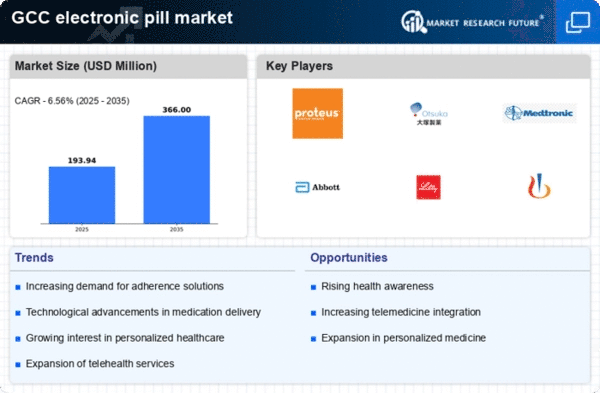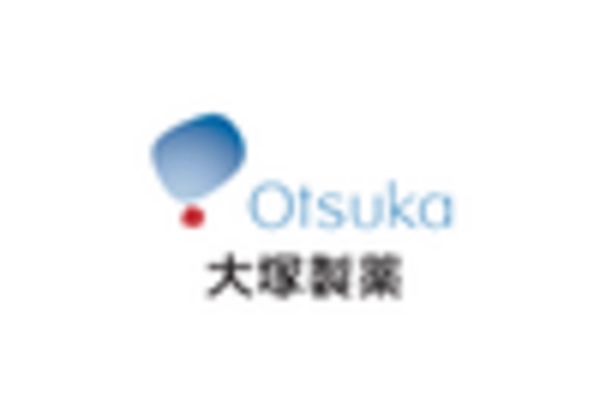Expansion of Telehealth Services
The expansion of telehealth services in the GCC is significantly influencing the electronic pill market. Telehealth has gained momentum as a viable alternative to traditional healthcare delivery, particularly in remote areas. The GCC telehealth market is expected to grow at a CAGR of 15% from 2025 to 2030, driven by the increasing demand for accessible healthcare solutions. Electronic pills complement telehealth services by providing healthcare providers with essential data on patient medication adherence and health status. This integration allows for more effective virtual consultations and follow-ups, enhancing the overall patient experience. As telehealth continues to evolve, the electronic pill market is likely to see increased collaboration with telehealth platforms, fostering innovation and improving patient outcomes.
Growing Focus on Preventive Healthcare
The electronic pill market benefits from a growing focus on preventive healthcare within the GCC region. Governments and healthcare organizations are increasingly emphasizing the importance of early detection and management of health conditions to reduce long-term healthcare costs. This shift is reflected in the rising investments in health technology, with the GCC healthcare expenditure projected to reach $100 billion by 2025. Electronic pills play a crucial role in preventive healthcare by enabling patients to monitor their health proactively. By providing real-time feedback on medication adherence and health metrics, these devices empower patients to take charge of their health. As preventive healthcare gains traction, the electronic pill market is likely to see increased adoption and innovation in product offerings.
Rising Demand for Remote Patient Monitoring
The electronic pill market is experiencing a surge in demand for remote patient monitoring solutions. This trend is driven by the increasing prevalence of chronic diseases in the GCC region, which necessitates continuous health monitoring. According to recent data, the GCC healthcare sector is projected to grow at a CAGR of 10% from 2025 to 2030. Electronic pills facilitate real-time data collection, enabling healthcare providers to monitor patients' adherence to medication regimens effectively. This capability is particularly crucial in managing conditions such as diabetes and hypertension, where medication adherence is vital for patient outcomes. As healthcare systems in the GCC increasingly adopt digital health solutions, the electronic pill market is likely to benefit from this shift towards remote monitoring and personalized healthcare.
Increased Investment in Health Technology Startups
The electronic pill market is experiencing a surge in investment in health technology startups across the GCC region. Venture capital funding for health tech is projected to reach $1 billion by 2025, indicating a robust interest in innovative healthcare solutions. This influx of capital is fostering the development of advanced electronic pill technologies that enhance medication adherence and patient engagement. Startups are increasingly focusing on creating user-friendly devices that integrate seamlessly with mobile applications, allowing patients to track their medication schedules and receive reminders. As the ecosystem for health technology startups expands, the electronic pill market is likely to benefit from new ideas and solutions that address the evolving needs of patients and healthcare providers.
Integration of Artificial Intelligence in Healthcare
The integration of artificial intelligence (AI) in healthcare is emerging as a transformative driver for the electronic pill market. AI technologies enhance the functionality of electronic pills by enabling advanced data analytics and personalized treatment plans. In the GCC, investments in AI healthcare solutions are expected to reach $2 billion by 2025, reflecting a growing recognition of AI's potential to improve patient outcomes. Electronic pills equipped with AI capabilities can analyze patient data to provide insights into medication adherence and efficacy. This not only improves patient engagement but also allows healthcare providers to make informed decisions based on real-time data. As the GCC healthcare landscape evolves, the electronic pill market is poised to leverage AI advancements to enhance patient care and streamline medication management.
















